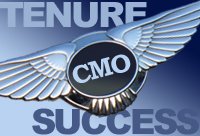Good readin': The Lifespan of the CMO
 Great article this morning in Advertising Age on the average lifespan of a Chief Marketing Officer. The article cites a study by Spencer Stuart, which says that the lifespan of the average CMO shrunk slightly from 23.6 to 23.2 months this year.
Great article this morning in Advertising Age on the average lifespan of a Chief Marketing Officer. The article cites a study by Spencer Stuart, which says that the lifespan of the average CMO shrunk slightly from 23.6 to 23.2 months this year. The story cites some interesting reasons for the "alarmingly short" CMO lifespan, including pressure to perform, being hindered by the CEO, short-term demands of Wall Street and executive "poaching." This may validate things many of us intuitively know.
I had some thoughts as I perused this article... First, I couldn't help but carefully consider this quote from Jeff Bell, VP Global Marketing at Microsoft's Interactive Entertainment Business:
"The shorter tenure is in part a reflection of the change from failing traditional-marketing approaches to less-defined and more dynamic approaches...Clearly the skill set of CMOs is changing from 'TV, TV and more TV' to interactive media. ... As the world of marketing completes this transition, the tenure will stabilize."
Couple thoughts...
First, what is "less defined and more dynamic?" In the new marketing paradigm, if marketing is more dynamic, then shouldn't it then be even MORE defined - so that the organization can be proactively prepared to meet the customer's need with agility?
Next, I respectfully assert that it's important to realize is that it's not just about interactive media these days. I agree that executives who don't understand how to leverage the principles of interactive media will be left behind. However, marketers who think only with a new media mindset may very well miss out on the critical need to create synchronized experiences across online and offline channels that build brand cohesion and customer affinity. Further, they may neglect the very large portion of our consumer audience that is aging or elderly. These populations grew up on traditional media....and they've got a lot of buying power. So it's really about conversion and experience, in the end.
Finally, the job tenure may well stabilize over time. However, we can't forget that there's a lot of experimentation going on in traditional and emerging channels such as wireless. There will be a lot of trial and error - and with the error will come shakeout. So the stabilization may take a longer period of time than we may like to see. This may well be compounded by more than the short-term demands of Wall Street as well as the short-term mentality exhibited by many executives today.
The article cites the fact that most executives (53%) have been in their job less than one year. Only 25% will make it to the three year mark. The article references the "revolving door" syndrome, as a major brand threat today. I've witnessed this in client environments, where much of the continuity within the marketing department is driven by the third-party advertising agencies that have provided ongoing support. It's a sad thing when your agency knows more about your history than you do...
So what does it take to be a CMO superstar? Pointing to icons like Starbuck's Anne Saunders and Burger King's Russ Klein, Greg Welch, CMO and practice leader for Spencer Stuart asserts:
"We believe the new super CMO and examples on this list were true general managers before they took the CMO role," said Mr. Welch. "The complexity of this job, the ability to be board-savvy and work cross-functionally effectively are the attributes of new CMO," he said. "That may be the new model of CMO that can make it last and make it work."
There's more to read, just a few highlights. Feel free to peruse the article yourself!
Subscribe to:
Post Comments (Atom)
FAVORITES
- On Trust & Influence
- Don't be Social Media Sharkbait
- The Social Media Engagement Continuum
- 10 Tips for Twitter Unmarketing
- Five Experience Funamentals
- Experience & Branding: The Three Word Rule
- Get Some Experience Healing!
- Discovering Customer Experience Pitfalls
- Not My Job: The CX Enemy
- Shoe Carnival: Watch Out for Carnies!
- Bathroom Usability
RECENT COMMENTS
SEARCH
LEIGH DURST

I’m Leigh Durst, a 20 year veteran in business, operations, customer strategy, ecommerce, digital & social media and marketing. Simply put, I’m a strategist that helps companies (start-up to blue chip) achieve business shift, create more compelling online and offline experiences. I also write, speak and teach about experience design and next-generation business. I’m a futurist, visionary, strategist, doer and connector with a passion for people and helping others. When I’m not on the road, you’ll find me in the San Francisco bay area, working, beaching it and hanging out with my family and dog.
Labels
Best Practices
CX
Community
Content
Copy writing
Customer Experience Leaders
Customer Relationship Management
Defining Customer Experience Management
Ethics
Group Think
Harassment
Innovation
Plagiarism
Plurk
RESOURCES
Social Media
Social Media Expert
Twitter
UX
Web 2.0
Web Strategy
advertising
air travel
bank experience
bathrooms
branding
brick and mortar retail
charlene li
cottonelle
customer centricity
customer experience
customer experience files
customer experience management
customer experience pitfalls
customer experience; innovation;
customer research
economy
experience best practices
experience file
experience pitfalls
good customer experience
infrastructure
life
marketing
marketng
motherhood
old navy
personal
privacy
reinvention
restaurant experience
retail experience
security
social networking
starbucks
stuck
target
toilet paper
trust agents
trust continuum
usability best practices
user experience
user experience
word-of-mouth



0 comments:
Post a Comment